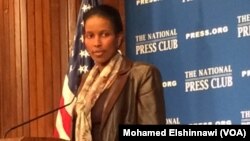A prominent author and controversial critic of modern Islam argues in a new book that the most effective way to defeat violent extremism is through comprehensive reform of Islam.
“Ultimately, this is a creed and ideology that one-fifth of humanity believes in,” Ayaan Hirsi Ali, author of Heretic: Why Islam Needs a Reformation Now, recently told scholars and journalists in Washington. “We cannot get away from the reality that there is something within Islam that inspires, incites and mobilizes millions of people to engage in what our president euphemistically calls…‘violent extremism.’”
Ali says a reform of Islam should include a rejection of the idea that believing can or should be imposed by the sword; something she argues increases the allure of martyrdom.
She also appeals to Muslims to clearly separate religion and politics and to make it clear that it was unacceptable for IS fighters to use force to establish a caliphate. She mentioned several examples of Muslim nations who reject the Sharia Islamic law advocated by strict Islamist groups such as the Muslim Brotherhood in Tunisia and Egypt.
“There is enough evidence in Tunisia that there is a substantial body of the population who, when they were presented with an agenda for political change based on Sharia law, a majority of Tunisians made the choice to go with the secular government,” Ali said.
The author argues that Egyptians in 2014 were faced with a choice between two very bad options; Sharia law that came about through the ballot box, or a return to secular military law. A significant number of Egyptians chose the secular option.
She praised a January speech by Egyptian President Abdel Fattah el-Sissi as “something new and incredibly brave.” In that speech, Sissi appealed to Islamic scholars for a “religious revolution” and discourse that adapts itself to a new world.
Ali acknowledged that reforming Islam could take decades, and that the West has a role to play in that reform.
“I would say we have to side with those individuals and those groups who are trying to bring about that kind of change,” she said. She recommended that Western nations invest in the younger generation of Muslims and empower Islamic reformers trying to achieve the necessary change.
The Somali-born activist said countering the hateful ideology of extremist groups will also require a powerful campaign to counter negative stereotypes about the United States in the Muslim world.
“If you look at what the Islamic extremists are saying about America in their writings to the Muslim people; it is stereotypes like ‘America is greedy', ‘America just wants to come and take your oil’, ‘America is supporting despots to feed their consumerism,’” she said.
The Muslim world, for example, knows very little about the large numbers of American volunteers helping people in turmoil across the world, Ali pointed out, or how much money the United States spends in aid across the globe.
“Where we are not taking them on is on the battlefield of ideas,” she said, citing public diplomacy as it was practiced during the Cold War.
Engaging Muslims, she said, will help bring about reform – and ultimately defeat the extremists.
Watch video of Ali's speech and discussion below:




